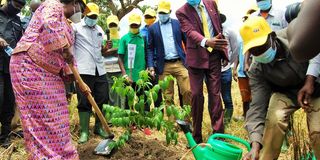Govt, private sector partner to restore depleted forests

The State Minister for Northern Uganda, Ms Grace Kwiyucwiny, plants a tree during the restoration exercise of Enjeva Central Forest Reserve in Arua District at the weekend. PHOTO/FELIX WAROM OKELLO
What you need to know:
The partners say the restoration of the forest cover is to ensure humanity lives in a better environment.
Government and the business community have teamed up to restore depleted forest cover across the country.
The continued cutting down of trees in central forest reserves in Arua District, forexample, by encroachers has been worrying leaders who say a possible desertification lies ahead.
The trees are cut for charcoal burning, firewood and log businesses.
Enjeva Forest Reserve in Arua is one of the natural green cover that has remained endangered with 200 hectares already destroyed.
Speaking during the reclaiming exercise of Enjeva Forest Reserve in Arua at the weekend, the National Forestry Authority (NFA) range manager for West Nile, Mr Robert Owiny, said: “Of the 738 hectares of forest cover in Enjeva, we have so far lost 200 hectares. We need this restored because if we don’t, the climate change effects will be adverse on the rain patterns.”
Mr Owiny said they had challenges with communities who do not want to leave the forests because they are settling and carrying out farming activities.
“It is unfortunate that the natural tree species such as Afzelia Africana and Shea are now depleted, yet these trees when planted, take long to mature,” he said.
However, hope is not lost. As part of a recovery exercise, MTN Uganda has allocated more than Shs400 million to reclaim depleted forests across the country.
This includes the 50 hectares of forest cover for Enjeva Central Forest Reserve.
The chairperson of Bongova Village, where part of the forest is located, Mr Isaac Onzoma, said: “The trees that are being planted as part of the recovery scheme should be protected by the communities. We shall do more sensitisation with the community.”
Mr Onzoma said due to depletion of the forest, the rain pattern has been affected.
The head of marketing at MTN Uganda, Mr Ibrahim Senyonga, said: “We are now recovering 250 hectares of forest cover in five central forest reserves across the country. We need to avert the climate change in our country so that farmers can be able to receive reliable rainfall for increased production of agriculture.”
The State minister for Northern Uganda, Ms Grace Kwiyucwiny, n said: “If we destroy the forest cover, there will be flooding and landslides, which will eventually displace people. We need to avert this early.”
Ms Kwiyucwiny, added: “It will be shameful for communities to burn or destroy what we are planting now. Besides, we need to protect wetlands and swamps so that farmers can use the water for irrigation.”
She noted that even when the forests are destroyed as a result of population pressure, proper planning can be done to protect the forests.
At Enjeva, the hills have remained with dotted natural trees with Shea nut species being countable as opposed to the past years when the area had a thick forest cover.




